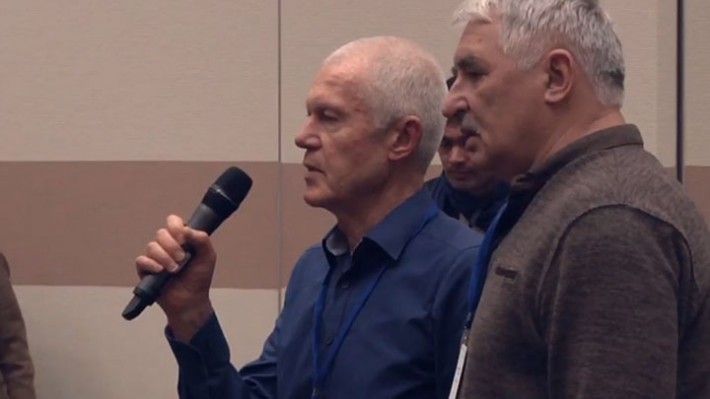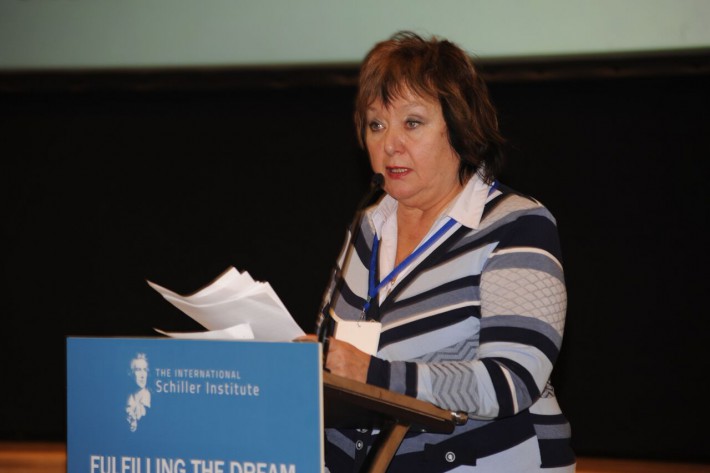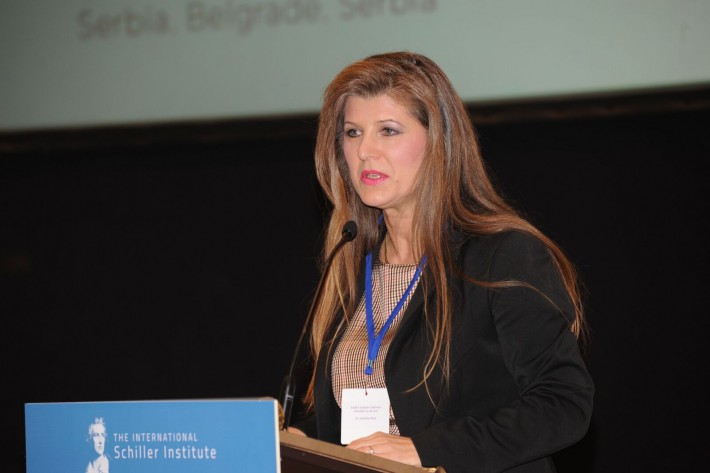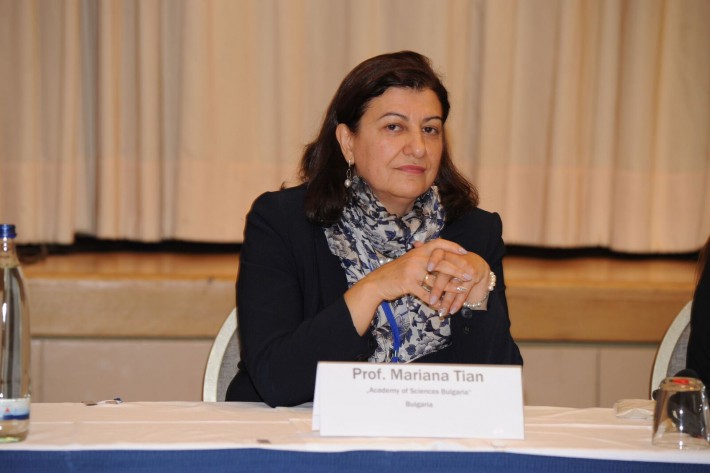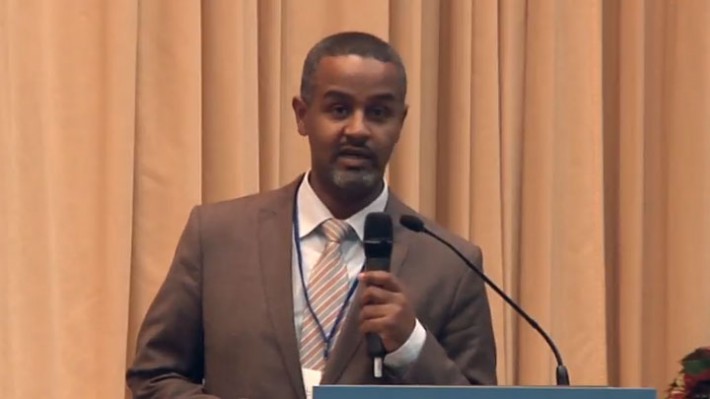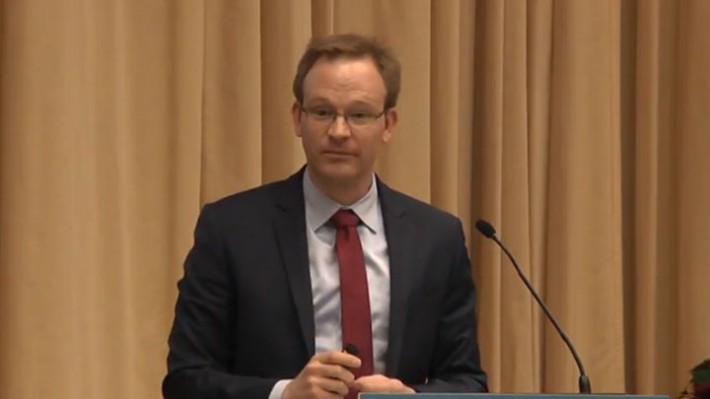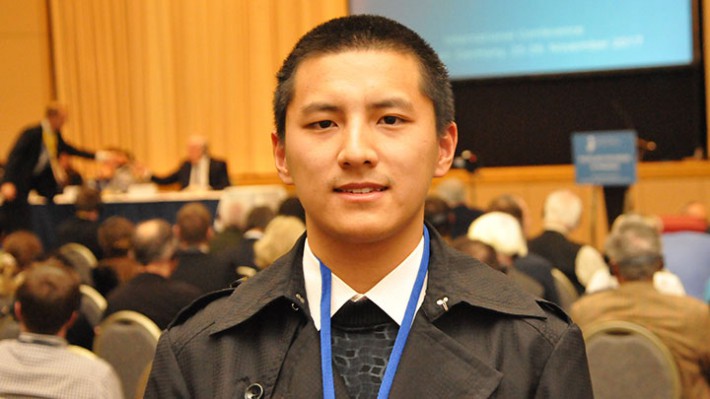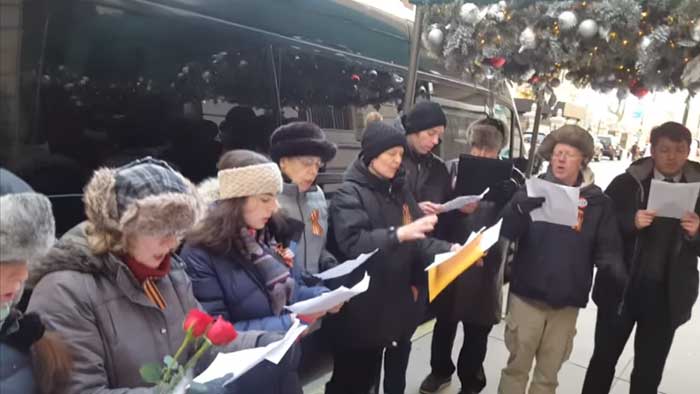Panel 2 – Dialogue: QUESTIONS & ANSWERS
Dr. Natalia Vitrenko, Doctor of Economics, MP (1994-2002) and Chairwoman of the Progressive Socialist Party of Ukraine
Dr. Jasminka Simic, Author and Journalist, PhD, Research Fellow and Editor-Journalist of the Radio-Television of Serbia, Belgrade, Serbia
Prof. Mariana Tian, Institute for Historical Studies, Bulgarian Academy of Science
Dr. (Cand.) Alexander Demissie, Founding Director of The China Africa Advisory
Guo Wentao
Current Situation of High-Temperature Gas-Cooled Reactors in China
Guo Wentao, with the Paul Scherrer Institut, delivers a presentation to Panel IV of the Schiller Institute’s international conference, Fulfilling the Dream of Mankind, in Bad Soden, Germany, November 26, 2017. His speech is titled “Current Situation of High-Temperature Gas-Cooled Reactors in China.”
COPENHAGEN, February 17, 2017 (EIRNS) — They came from around the world. They came bearing gifts. Not gifts you could touch with your hands. But gifts that touched your soul. Gifts of beautiful music, and beautiful dance.
And the people came to hear them. And they kept coming, and they kept coming till none of the 120 seats were left. And after there was no more room for extra chairs, they stood in the aisles, and they stood in the lobby, and they sat behind the curtains. They were Danes, and they were diplomats, and other people, from many nations, maybe 180-200 in total. The hostess said that there had never been so many there before.
The dialogue of cultures between the sponsors of the concert, itself, led to the great success – The Schiller Institute, The Russian-Danish Dialogue organization, The Russian House in Copenhagen, and the China Culture Center of the Chinese Embassy (about to open, which also provided intermission food). And the concert was held in The Russian Center for Science and Culture, representing the Federal agency for the Commonwealth of the Independent States (of the former Soviet Union), compatriots living abroad and the international humanitarian cooperation (Rossotrudichestvo).

Firstly, the people were told by Schiller Institute chairman Tom Gillesberg that we have a unique moment in world history, where the potential is there for the U.S. to join the new paradigm of economic development sweeping the world. Secondly, they were told by the spokeswoman for Russian-Danish Dialogue, Jelena Nielsen, that a dialogue of culture can lead to peace in the world. They were also the interchanging hosts for the evening. Thirdly, the director of The Russian Center for Science and Culture, Artem Alexandrovich Markaryan, welcomed the people.
Then the procession of gift-givers began.

Bai Claire Jie/Schiller Institute in Denmark
From Russia came children playing Russian folk songs on balalaikas, (the “Svetit Mesjac” (The Moon is Shining) ensemble from The Russian House, conducted by Igor Panich), including Katjusha, with soloist Valerij Likhachev (left), baritone, who has sung on 200 stages. He also later performed Leperello’s list aria, from the opera Don Giovanni by Mozart, and Mephistopheles’ couplets, from Gounod’s opera Faust, together with his pianist Semjon Bolshem.
From China’s Mongolia came a very musical young science student, Kai Guo, who played many flutes, and charmingly sang the Kangding Chinese love song, as a duet, with Feride Istogu Gillesberg from The Schiller Institute.
From Indonesia came a traditional dancer, Sarah Noor Komarudin, who filled the room with her graceful Jaipong dance.
From Ghana came two young men, Isaac Kwaku and Fred Kwaku, who sang and played a religious song, and a song about when we work together, we are stronger than when we stand alone.

Kai Guo (Bai Claire Jie/Schiller Institute in Denmark)
And from Denmark and Sweden came three outstanding female opera singers, whose tones, and dramatic intensity, moved the audience profoundly. Their offerings were songs and arias from Schubert, Verdi, Dvořák and Sibelius. Gitta-Maria Sjöberg, an international bright star of a soprano, who recently retired from The Royal Danish Opera, sang Rusalka’s Song to the Moon by Dvořák. Idil Alpsoy, a fantastic mezzo soprano with roots in Hungary and Turkey, who is also a member of the Middle East Peace Orchestra, sang songs from Sibelius’ Op.37 and 88. And a soprano, Leena Malkki, we have heard for many years blossoming into a truly magnificent artist, sang Schubert’s Gretchen am Spinnrade (spinning wheel), and Desdemona’s prayer Ave Maria, from Verdi’s opera Othello. The first two were accompanied by Christine Raft, an extremely talented young Danish pianist, and the later by The Schiller Institute’s own Benjamin Telmányi Lylloff.
He, and his mother Anika, poignantly played Beethoven’s Romance for violin and piano, continuing the legacy bequeathed by their ancestor from Hungary, the violin soloist Emil Telmányi Lylloff.
For the finale, all the singers (but one), sang Verdi’s chorus of the Hebrew slaves longing for freedom, Va, pensiero, with the addition of four members of The Schiller Institute’s future chorus. See the program at: www.schillerinstitut.dk/si/?p=17637

Sarah Noor Komarudin (Bai Claire Jie/Schiller Institute in Denmark)
And the people were uplifted, with each presentation by itself, and with the succession of one piece of music, or dance, after the other, one country after another, traditional music in dialogue with classical music, weaving a tapestry of sound, sight and delight, not reaching their senses, but their soul.
And the people were asked to be in contact with us, and to consider joining The Schiller Institute’s chorus, some of whom wrote that they would.

Fred Kwaku (piano) and Isaac Kwaku (singing, with a drum).
As they left, they all expressed the most sublime joy and thankfulness for having had the privilege to have received all of these precious gifts, which they took home in the memory of their minds, to be opened again, and again.
A musical testament to the paradox of the unity and diversity of mankind, expressed by human creativity, and a powerful statement of the dialogue of cultures was declaimed.
We will go forth with this statement, in the form of professional video and audio recordings, to spread its ripples throughout the world.

Schiller Institute in Denmark
Members of the NYC Schiller Institute Community Chorus sing the Russian National Anthem outside the Russian Consulate in New York in honor of the passengers, many of them members of the Alexandrov Ensemble, who died when their plane crashed enroute to Syria, Sunday, December 25, 2016.
Founder and President of the Schiller Institute, Helga Zepp-LaRouche issued the following message:
Message of condolence to the Alexandrov Ensemble and the People of Russia
In the name of the International Schiller Institute, I wish to express our deep condolences for the tragic loss of the the 92 human beings who died in the plane crash on the way to Syria. This accident is all the more a cause for sadness, as the music and patriotic spirit characteristic of the members of the Alexandrov Ensemble would have brought a message of hope to the people of Syria. This is a population victimized by more than five years of the criminal policies of regime change and treated as the pawns in a geopolitical game in complete violation of their sovereignity.
The Alexandrov Ensemble has been an expression of the highest moral values of Russia and, like classical choral singing in general, speaks to the soul and the creative potential of the audience. It is therefore extremely important that Russian Defense Minister Sergei Shoigu announced that he is initiating auditions to pick the best talents to fully restore the Alexandrov Chorus.
The training of the singing voice is important for everybody, since a well-placed voice can express the creative intention of the composer and directly speak to the same faculty in the audience. It represents, therefore, an irreplaceable element of the harmonious development of the character. Let me therefore share with you the idea that, in addition to rebuilding the Alexandrov Ensemble, thousands of Alexandrov choruses be established in schools all over Russia to honor the heroic contribution of Russia in the liberation of Syria and, at the same time, broaden the uplifting effect of choral singing to the young generation.
There is a New Paradigm in the process of becoming as exemplified by the integration of the Eurasian Union and the New Silk Road Initiative, establishing a completely new kind of relations among nations. We need a dialogue of the best tradtions of each culture for this New Paradigm to grow into a new era of civilization—the knowledge of the best of another culture will lead to a love for it, and therefore supercede xenophobia and hatred with more noble emotions. In this new era, geopolitics will be overcome forever and the dedication to the common aims of mankind will establish a higher level of reason. It is a reason for consolation for all of us, that the tragic death of the victims of the plane crash contribute with their immortality to the building of that better world.
Helga Zepp-LaRouche
Chairwoman, International Schiller Institute












